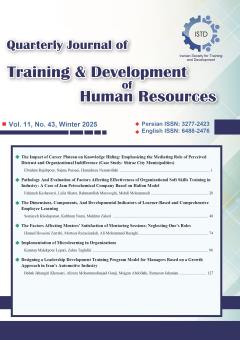Pathology And Evaluation of Factors Affecting Effectiveness of Organizational Soft Skills Training in Industry: A Case of Jam Petrochemical Company Based on Halton Model
Subject Areas :
Fahimeh Keshavarzi
1
,
Leila Shater
2
![]() ,
رحمت اله مرزوقی
3
,
mehdi mohammadi
4
,
رحمت اله مرزوقی
3
,
mehdi mohammadi
4
1 - Department of Educational Sciences, Faculty of Educational Sciences and Psychology, Shiraz University, Shiraz, Iran
2 - PhD student, Faculty of Educational Sciences and Psychology, Shiraz University, Shiraz, Iran.
3 - Department of Educational Sciences, Faculty of Educational Sciences and Psychology, Shiraz University, Shiraz, Iran
4 - Department of Educational Sciences, Faculty of Educational Sciences and Psychology, Shiraz University, Shiraz, Iran
Keywords: organizational training, learning transfer, soft skills, oil industry,
Abstract :
The aim of the present study was to identify and evaluate the effective factors on organizational soft skills training in industry based on the Halton model. This study was quantitative with regard to purpose, and it was applied and descriptive-survey in terms of method. The statistical population of the study included all trained employees, of which 232 people were selected as research samples using purposive and available sampling who were engaged in different positions in Jam Petrochemical Company. The research tool included the Learning Transfer Questionnaire (Waller, 2012), for which validity and reliability was confirmed using item analysis and Cronbach's alpha methods. The questionnaire was distributed among the individuals and the collected data were analyzed with one-sample t-tests and repeated measures analysis of variance using SPSS 21 software. The results of the study indicated that: 1- for comparing the average importance of individual factors affecting the lack of transfer of learning with the standard average, employees of Jam Petrochemical Company, respectively, considered the lack of positive individual results of transferring learning to the workplace, and the failure to fulfill their expectations of performance outcomes as the most important factors affecting their unwillingness to transfer learning to the real work environment. In the same vein, other factors did not show any significant effects on their unwillingness; 2- for comparing the average importance of educational factors affecting the lack of transfer of learning with the standard average, employees of Jam Petrochemical Company did not evaluate the validity of the content and the transfer plan as important factors in the lack of transfer of their learning from soft skills training courses to the workplace; 3- for comparing the average importance of organizational factors affecting the lack of transfer of learning with the standard average, employees of Jam Petrochemical Company considered the importance of lack of support from colleagues, lack of support from supervisors, and the opportunity to apply their learning in the real environment as factors affecting their unwillingness to transfer their learning to the real work environment; However, other factors did not have a significant effect on their unwillingness; 4- there is no significant difference between the importance of the three factors of individual, educational, and organizational in the failure to transfer the learnings of soft skills training courses to the workplace.
